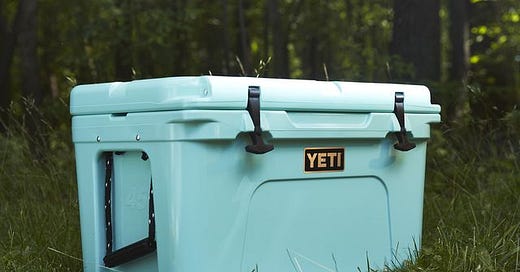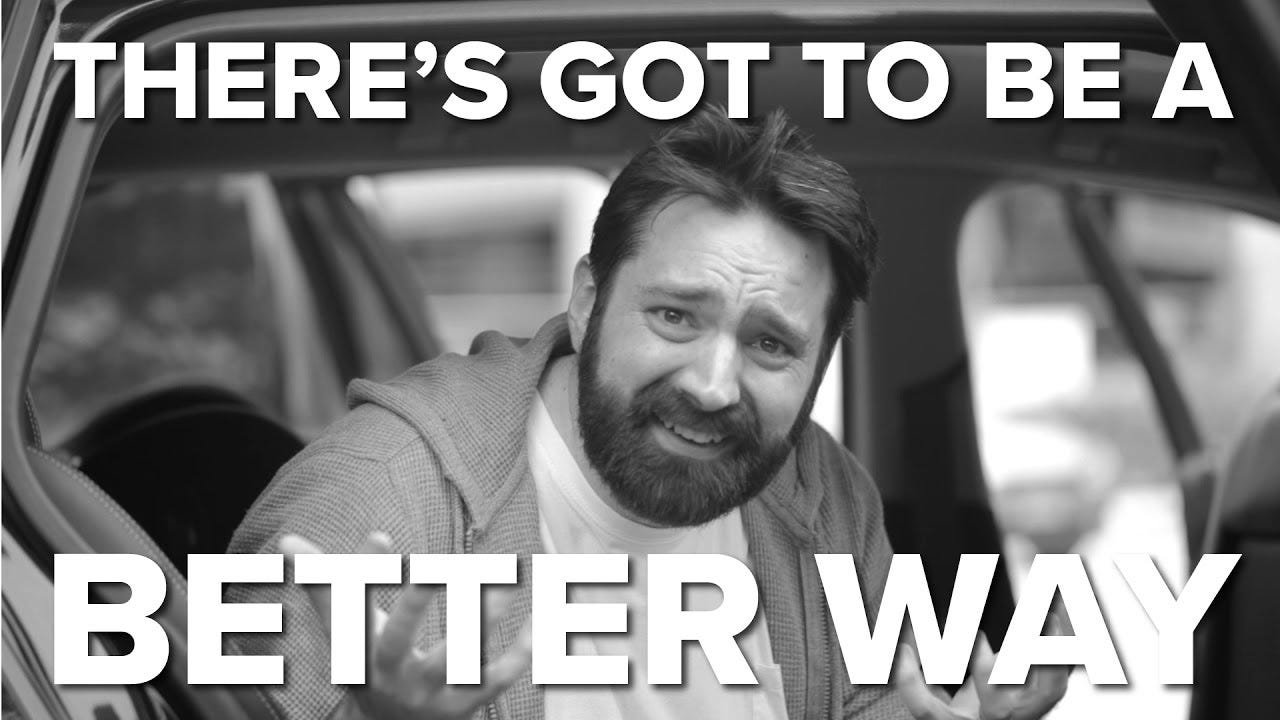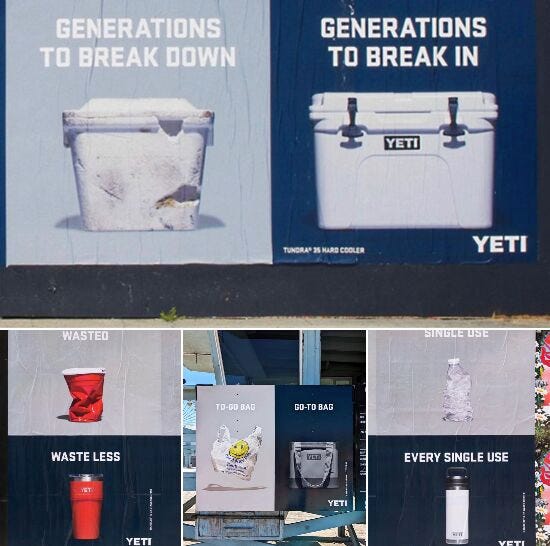Here in the U.S., it’s 4th of July weekend. Which means you’re likely to find yourself at a BBQ, camping, on a boat (if you’re lucky enough to have friends with boats), and so on. Which means you’re likely to encounter one of these:
Yeti has become the status symbol for coolers here in the U.S., built off its tougher-than-a-grizzly bear reputation, particularly among a certain kind of guy: middle-aged, white, middle-to-upper class, outdoorsmen. Yet, they’ve been able to market to this group through what is arguably a sustainability message (and even have a DEI initiative).
In a time when some of these same Americans are swearing off buying EVs, and declaring any attack on gas stoves as an attack on their freedom, how is Yeti able to not only fly on by but grow into a $3B+ company?
If we can’t find what we want, we make it
Necessity is the Mother of Invention
The story of Yeti starts like many, with a glaring need. Brothers Roy and Ryan Seiders grew up in Austin, TX fishing the nearby Gulf Coast.
To better see the game they were targeting, Roy and Ryan often tried to get higher by standing on the coolers they brought. But at the time, coolers weren’t built for this kind of sturdiness. The average cooler costs somewhere around $15-$30, wasn’t that durable, nor that reliable either for keeping the ice frozen long enough to keep whatever you caught fresh.
Tired of replacing cheap coolers that caved in on them while fishing, the Seider brothers decided
So they built their own, setting out to develop the world’s most durable cooler. That original cooler, the hard-sided Yeti, took off in popularity despite a higher price point ($200+) than the more widespread Coleman or Igloo coolers at the time.
This was in 2006, and 18 years later Yeti has grown into a $1.66B company in annual revenue. Operating in the United States, Canada, Australia, New Zealand, Europe, Hong Kong, China, Singapore, and Japan. And expanded beyond the initial core product into everything from soft-sided coolers to tumblers, specialty gear, and even clothing.
Durability is Sustainability
One of the major knocks on ‘environmentally friendly’ products is the premium that comes along with purchasing them. One recent study says most people are willing to pay 12% more for a sustainable product, yet the average price is somewhere around +28%.
Yet perhaps a simpler solution is to simply buy less. Thrifting and Slow Fashion, while harder to quantify, are examples of a ‘Buy Fewer, but Better’ way of thinking.
And in many ways, Yeti is a perfect representation of this. Directly from its raison d’etre, Yeti is an answer to poorly crafted, cheaper coolers. Overengineered to withstand pretty much anything and thus heralded for its ability to take a licking and also keep ice cold for days, Yeti’s price premium isn’t viewed as a ‘green tax’, but rather earned by its performance and tech.
More importantly, Yeti can talk to its sustainability through its durability. This a message that transcends our political divide, because regardless of who you vote for-no one enjoys wasting their money on things that won’t last (or on food that gets spoiled in a cheap cooler).
In a time where many companies are walking back on their ESG goals or outright cowering to their most conservative customers (see Tractor Supply above), Yeti stands out for its ability to not only stay committed but use it as a marketing tool to continue to build the brand.
“In today’s polarized political climate, conservation has become a partisan issue with decision makers, but hunters and anglers strongly support conservation policies across the board, whether they’re Republican, Democrat, or Independent,” Whit Fosburgh, president and CEO of the Theodore Roosevelt Conservation Partnership.
Authentically Self Interested
The other trick Yeti has going for it is when they speak about environmentalism, you believe it because it ties directly back to the community from where it was born.
“Single-use plastics are a real problem for our fisheries and our riverways—the places where Yeti folks love to play. “To provide a solution that limits that damage is a tremendous asset for us. It’s something we can help with.” - Paulie Dery, Yeti CMO
Many who hunt and fish also tend to be conservative in their politics, they also believe in protecting the environment because it impacts their passions. In fact, Yeti was able to survive a potential conflict with the NRA in 2018 when the gun rights group called out Yeti for ‘no longer selling products to the NRA’. Resulting in a number of NRA members posting elaborate videos of shooting and destroying their own Yeti coolers in protest.
In the end, the love for the cooler prevailed, with NRA issuing a ‘ceasefire’ to its members telling them “Put a big ‘I STAND WITH THE NRA FOUNDATION’ sticker on your YETI cooler and keep using it. They cost too much money to destroy to make a statement. Let a sticker make your statement.”
In a time when people are willing to burn their $100+ Nikes or shoot up perfectly fine beer, that’s a statement.
Yeti Facts and Figures:
Founded 2016 by brothers Roy and Ryan Seiders
Headquartered in Austin, TX YETI is a global designer, retailer, and distributor of innovative outdoor products.
$1.66B company in net sales in CY23
Split their products into three categories
Coolers and Equipment (36% of net sales)
Hard coolers - built to be virtually indestructible with seamless or injection molding construction
Soft coolers - designed to be leakproof and superior ice retention to other soft bags on the market
Cargo bags and Outdoor living - includes everything from Loadbucket, to luggage, camping chair etc; retaining superior durability associated with their coolers
Drinkware (62% of net sales)
Made with durable, kitchen-grade, 18/8 stainless steel, double wall vacuum insulation, and an innovative No Sweat design.
Other (2% of net sales)
Apparel, gear, and other equipment
Distribute through omnichannel and direct-to-consumer
Omni-channel (x % of sales) includes national and regional partners through the United States, Canada, Europe, Australia, New Zealand and Japan
Direct-to-consumer via Yeti.com as well as country-specific sites, as well as on Amazon marketplace and Yeti retail locations (20+ locations)







